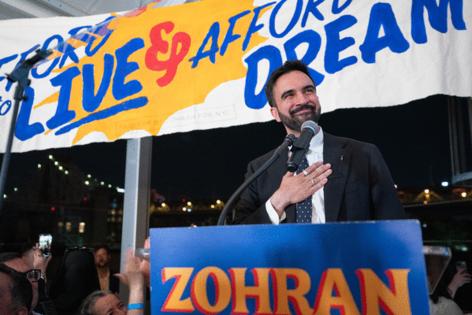Commentary: Mamdani & NYC's unaffordable economy
Published in Op Eds
The promise of taxing the rich to fund social services propelled Zohran Mamdani to victory in Tuesday’s New York City Democratic mayoral primary. His campaign vows to reverse decades of social service cuts and tackle NYC’s pervasive unaffordability.
Taxing the rich for the sake of the poor, however, contains an inherent contradiction. The wealthy are, in part, the very group whose concentrated economic activity has displaced working-class housing and jobs for decades. To rely on them to finance an affordable city risks merely perpetuating the problem, a lesson previous mayors learned too late.
For Mamdani to truly succeed, he must do more than just tax the rich — he must remake the city’s economy in the interests of its workers.
This is not a new insight. As my book “The Menace of Prosperity” details, as far back as Henry George, perceptive New Yorkers understood the intrinsic link between the growth of local wealth and the growth of local poverty.
Escalating land values directly translate to higher rents and increased homelessness. Unchecked real estate speculation displaces working-class enterprises and communities. This cycle inevitably leads to growing poverty, elevated crime rates, and declining public health.
These social costs, largely generated by an economy designed around the wealthy, are then inevitably passed on to the public sector. Welfare spending and critical social services, for instance, become downstream necessities, mitigating the precarity and homelessness that directly result from an economic model built to serve the needs of the rich. And such high costs repeatedly led to public bankruptcy — in the 1870s, the 1930s, and again in the 1970s.
The administration of liberal Mayor John Lindsay perfectly exemplifies this tendency. Throughout the 1960s, New York City’s financial sector boomed, yet simultaneously, poverty rates soared, deindustrialization accelerated, and housing costs skyrocketed.
Lindsay attempted to tax corporations to fund welfare services for the poor, but in the same breath, he actively subsidized the very corporations whose presence contributed to making the city unaffordable. Such expenditure on behalf of both the rich and the poor ultimately sank the city’s finances.
This argument is not to deny the crucial role of social spending, nor to dismiss the importance of robust wealth taxation. However, if Mamdani truly intends to fulfill his campaign promise of making New York City affordable, he must move beyond merely treating symptoms and confront the ultimate cause: an economy fundamentally designed to render the city unaffordable for most.
Fortunately, compelling examples exist both within NYC and globally that demonstrate a path forward. Worker-owned cooperatives, social housing initiatives, and community-led nonprofit enterprises offer models for providing residents with decent livelihoods without driving up urban unaffordability.
Cooperatives, for instance, have shown a proven ability to increase employment faster than conventional firms and to better preserve well-paying jobs during economic recessions.
Cities can actively promote these models. A prime example is Preston, U.K., which successfully halved its poverty rate by strategically redirecting economic development funds and municipal contracts towards local cooperatives and community-owned businesses.
New York can replicate and expand upon these principles. Instead of wastefully channeling billions to corporations whose promises of jobs and increased tax revenue frequently fall short, we must redirect strategic economic development funds and pension investments towards worker-owned enterprises and small businesses.
Instead of selling off vacant city land to for-profit developers, we must transform it into vibrant hubs of small business and cooperative enterprise, stewarded by community land trusts and nonprofit organizations.
Rather than sacrificing equity for growth, we must unlock the full economic potential of all our citizens, leveraging the city’s power as an institutional investor to encourage progressive worker representation in our business dealings. All this promises to both help make our city affordable and reduce our tax burdens.
All this is not to deny that robust wealth taxation remains essential for building an affordable city. But as we tax the rich, we must strategically deploy those revenues to fundamentally displace their outsized hold on our economy, fostering a truly democratic and sustainable future for all New Yorkers.
_____
Wortel-London is a public policy researcher and visiting assistant professor of history at Bard College. He is also the author of “The Menace of Prosperity: New York City and the Struggle for Economic Development, 1865–1981.”
_____
©2025 New York Daily News. Visit at nydailynews.com. Distributed by Tribune Content Agency, LLC.

























































Comments